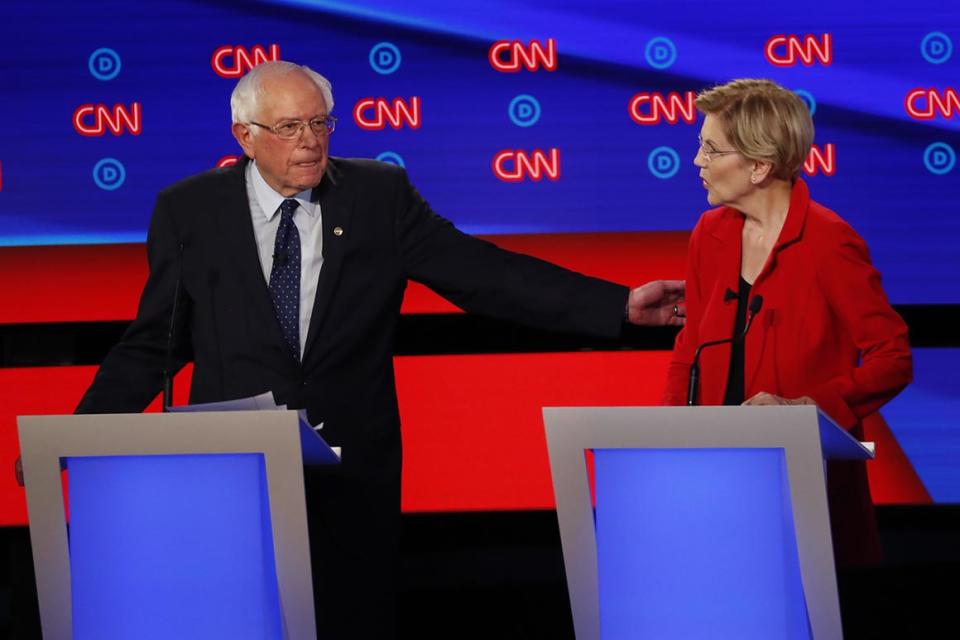Billionaire Mike Bloomberg tries on economic populism
The Democratic presidential primary is turning billionaire Mike Bloomberg, one of the world’s richest men, into an economic populist.
Gone are the strident defenses of the rich for their contributions to the economy, and the spats with working-class unions that came to sculpt Bloomberg's public persona during his three terms as New York City mayor. In their place, the businessman whose extreme wealth has allowed him to circumvent some of the traditional rigors of campaigning is making assertions that sound more like Bernie Sanders than Wall Street’s defender in chief.
“Too much wealth is in too few hands, and too few places as well. We have an economic inequality that’s distributed unfairly across this country," he declared in a speech in Chicago earlier this month. And during a trip to Tulsa, Okla., over the weekend, he said the next president must "make the issue of economic inequality a top priority."
In a Democratic Party where progressive populism has taken hold and several leading candidates like Sanders and Elizabeth Warren are railing against the concentration of wealth in the hands of a few billionaires, Bloomberg’s evolution is something of a political necessity.
It’s also a way for Bloomberg to differentiate himself from President Trump, whose tax cuts have only served to heighten insecurities about rising income inequality. A new Pew Research Center survey found 61 percent of adult Americans feel there is “too much” inequality in the country. The concern was even more prevalent among Democrats and those who lean left.

"It’s a recognition of how the discourse in the Democratic Party has changed since Bloomberg was in office, and even since the last election," said New York-based Democratic consultant Neal Kwatra, who is unaffiliated with any presidential campaign. "Rhetorically at least he sounds a lot more progressive. He sounds a lot more like [Microsoft founder-turned-philanthropist] Bill Gates than he does [billionaire private equity pioneer] Stephen Schwarzman right now.”
“[It’s] also a recognition that if he’s going to be a part of a conversation, that he has to be aligned where the party’s priorities are,” he said.
Bloomberg’s team says the rebranding is not matched with substantive departures in policy — not because he's still fiscally moderate, but because he never really was.
They point to a suite of measures he championed as mayor, from a local Earned Income Tax Credit that amounted to $860 million over a decade, to free debt counseling. Poverty rates plateaued on his watch, bucking national trends and earning him an award as he left office in 2013.
But parts of his legislative record, in addition to remarks about wealth and his own personal fortune — more than $60 billion from the creation of his eponymous media company — evince a different type of politician, one more concerned with the plight of business owners than their workers.
Bloomberg is, after all, the mayor who opted to cheer up demoralized staffers at Goldman Sachs when a former executive pilloried the investment bank behemoth upon resigning. He considered it his duty to stick with companies that contributed so much money to the city’s tax base, but in the wake of the financial collapse, it emboldened the perception that he didn’t empathize with the working poor.
He also vetoed three pieces of legislation aimed at improving conditions for low-wage workers — guaranteed paid sick days, a “living wage” for companies receiving city subsidies and higher pay for certain building service workers.
“When it comes to creating jobs, government is not the architect of the economy — that’s the private sector’s job,” he said at the time. “Government is the steward. And to be a good steward, government must take a balanced approach to regulation.”
On the presidential campaign trail, however, Bloomberg has embraced paid sick and family leave and a higher minimum wage.
His mayoral spokesman Stu Loeser, who is working on his 2020 campaign, said Bloomberg was worried at the time about “disadvantaging companies that hire New Yorkers.”
Policies aside, Bloomberg’s own rhetoric about wealth — and deprivation — helped sketch the caricature of an out-of-touch billionaire.
He once described sleeping in homeless shelters as a “much more pleasurable experience” because his team improved conditions during his tenure.
“If we could get every billionaire around the world to move here, it would be a godsend that would create a much bigger income gap,” he also said on a radio show in 2013, speaking about the city’s tax base, but only underscoring the income inequality platforms of those seeking to replace him.
In an interview shortly after he jumped into the 2020 primary, Bloomberg told CBS host Gayle King his critics “had a chance to go out and make a lot of money” too.
“As president, Mike will tackle income inequality, create a fairer tax system in which the wealthy pay more, and he'll put Americans to work in better, higher-paying jobs,” campaign spokeswoman Julie Wood said.
She said he raised taxes on the wealthy as mayor — though in 2009 he reconsidered and opposed an income tax hike he supported in 2003 — and “created jobs that helped New York City recover from the great recession faster than anywhere else.”
Jon Paul Lupo, a New York-based Democratic consultant who worked on Bill de Blasio's short-lived presidential bid, said “it’s obvious that you have to talk about income inequality, you have to talk about progressive policies to win the primary."
"It shouldn’t come as any surprise that all of the polling shows that the aggregated Bernie and Warren coalition is a huge chunk of the primary — 40% if not more," he said.
Christopher Cadelago contributed to this report.

